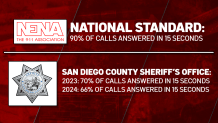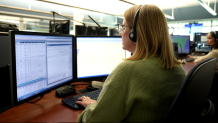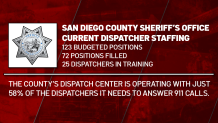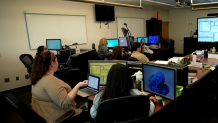Laura Munson’s mother waited nearly two minutes for an emergency dispatcher to answer, hoping to hear a human voice on the other end of the line. Laura’s father, Bob, was unconscious and needed an ambulance.
As precious seconds ticked away, her mother hung up and re-dialed 911. Again, the call went unanswered for what felt like far too long.
Munson’s parents were staying with her, her husband and kids at their Ramona home in February 2023. On that weekday morning, Munson was working remotely in her kitchen while her folks were in the guest house.
“Right as I was ending my meeting, I saw that I missed a call from my mom,” Munson said. “My mom was sitting next to him, trying to get help and they weren’t picking up. I think that’s very sad.”
When Munson’s mother couldn’t reach 911, Laura’s family drove her dad to the hospital themselves.

Munson said the drive to the hospital took 45 minutes. Her father died later that day.
“He was a very good dad," Munson said. "A very loyal husband to my mom, very faithful to the family my whole life. And it’s hard to not have him here.”
NBC 7 Investigates searched through records of individual 911 calls made during Munson’s father’s emergency. We found two calls that matched the time frame her mother called. One went unanswered for 1 minute and 54 seconds. The next rang for 36 seconds before the call ended.
“I’ve always kind of thought of 911 as being there when you needed them,” Munson said. “And I don’t want to fault anybody, but that was crazy: In a desperate moment, not having 911 pick up or be available.”
Missing the mark on national standards
Brian Fontes, the CEO of the National Emergency Number Association (NENA), told NBC 7 Investigates that the family’s experience isn’t an outlier.
“No, I don't feel good about those scenarios,” Fontes said. “I don’t think anybody would feel good about the scenario you just painted.”
NENA sets national standards for 911 call centers. Under those standards, dispatchers should answer 90% of all 911 calls within 15 seconds.
“If it’s 20 seconds, 30 seconds, 40 seconds, or a minute, I’m very concerned,” Fontes said.
In 2023, San Diego County’s 911 center only answered 70.3% of calls within 15 seconds. Last year, only 66.2% of callers reached a human being within 15 seconds.

Jeff Hebert is one of three managers who oversee the county’s 911 dispatch center. There are 19 local law enforcement agencies and fire departments that answer 911 calls placed within San Diego County. The sheriff’s office answers callers in unincorporated areas and in cities that rely on the sheriff’s office for law enforcement services, such as Encinitas, Vista and Ramona, where Munson lives. Hebert said they get more than 700,000 calls per year, about 2,000 a day.
“We obviously want to answer everything — every single phone call — in a timely manner where a caller doesn't have to wait,” Hebert said. “For me, personally, it's something I think about all the time.”
The county’s staffing problem

Hebert said delays in answering calls all come down to staffing. If the county’s call center was fully staffed, it should have 123 workers. Right now. only 97 of those positions are filled. And of those, more than a quarter can’t answer any calls yet because they’re still being trained. That means the county is running with just 58% of the people it needs to answer calls.
“It's actually a much lower number than we'd like to see. and it's lower than what we've seen in the last several years,” Hebert said.
“Anything short of a fully staffed center is putting consumers at risk in terms of the response time to the emergency,” Fontes said.

Hebert said they get plenty of candidates and pay pretty well for a job that only requires a high school diploma. Employees start at about $35 per hour when they begin training. But, he said, some applicants can’t pass criminal background checks.
“Since we are a law enforcement agency, our people have to go through an extensive background process, and we can't hire just anybody that's interested in doing the job,” Hebert told NBC 7 Investigates.
Others drop out during training, which is a process that generally takes 14-16 months.

“Young people don't grow up dreaming to be a dispatcher answering 911 calls and dispatching law enforcement and medics, etc.,” Herbert said.
Making matters worse, the call center is always dealing with people calling 911 when it’s not an emergency. In fact, Herbert said, non-emergency calls account for about a third of the calls, each one delaying a dispatcher from helping with a legitimate emergency.
Solving the staffing problem
The county is hoping to add remote working positions for dispatchers taking non-emergency calls. It’s also beefed up programs to recruit high school students, including the creation of a youth academy. The next session is tentatively scheduled for April.
You can learn more about becoming a 911 dispatcher at the San Diego Sheriff’s Office website.
Nationally, NENA has been pushing to change the dispatcher job classification from clerical to public safety. That matters, because it would give dispatchers better retirement options. They say public safety is a more accurate job-type description considering the trauma dispatchers deal with, and it would also be a huge hiring incentive.
Munson’s father was a retired police detective, so she understands how difficult public service can be. She hopes the system can be fixed so that no families will have to ask themselves the same questions her family is still asking two years after their calls for help went unanswered.
“Is there anything else the doctors could have done?" Munson wonders. "Could the ambulance have helped? I wonder all these things. I do."
Don’t hang up
One important thing to know: If you call 911 and they don't answer immediately, don’t hang up. If you do and try to call back, you’ll get pushed to the back of the line. Dispatchers also attempt to call back numbers when people hang up. That extra step adds even more time during times of delay.

